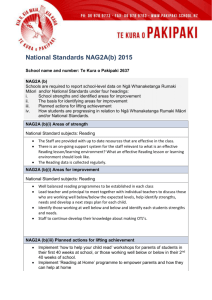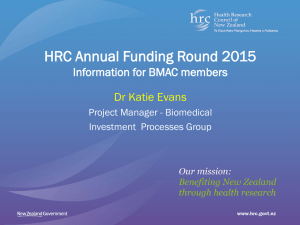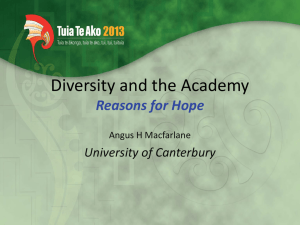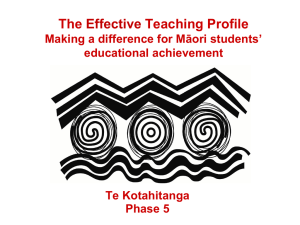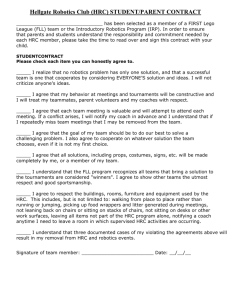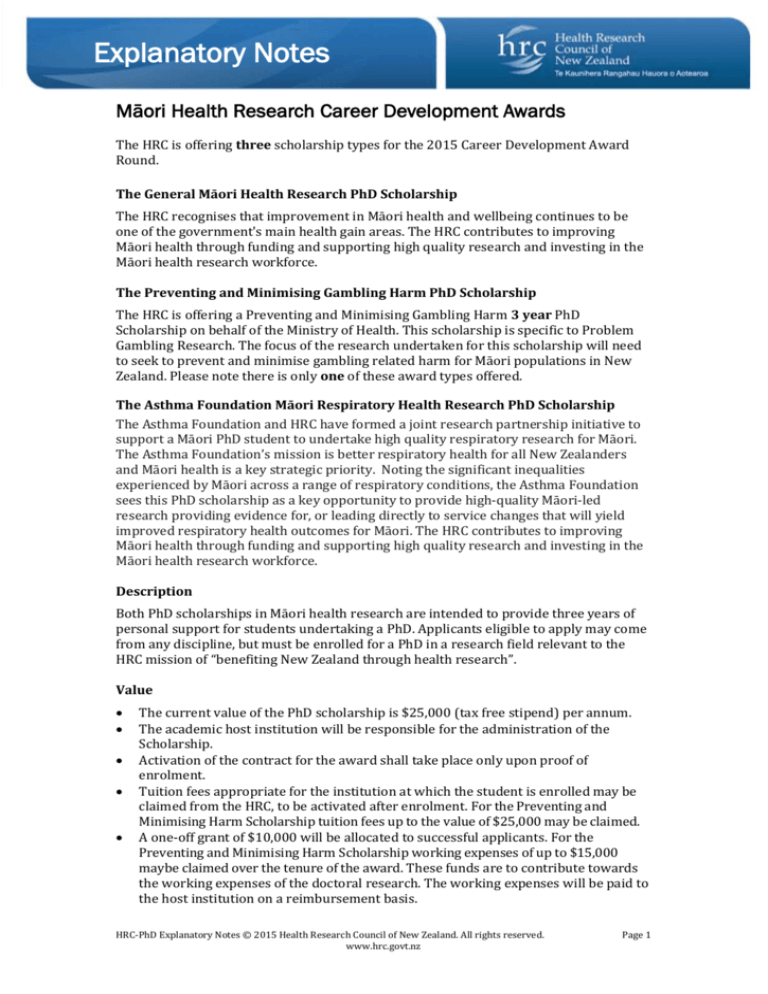
Explanatory
ExplanatoryNotes
Notes
Māori Health Research Career Development Awards
The HRC is offering three scholarship types for the 2015 Career Development Award
Round.
The General Māori Health Research PhD Scholarship
The HRC recognises that improvement in Māori health and wellbeing continues to be
one of the government's main health gain areas. The HRC contributes to improving
Māori health through funding and supporting high quality research and investing in the
Māori health research workforce.
The Preventing and Minimising Gambling Harm PhD Scholarship
The HRC is offering a Preventing and Minimising Gambling Harm 3 year PhD
Scholarship on behalf of the Ministry of Health. This scholarship is specific to Problem
Gambling Research. The focus of the research undertaken for this scholarship will need
to seek to prevent and minimise gambling related harm for Māori populations in New
Zealand. Please note there is only one of these award types offered.
The Asthma Foundation Māori Respiratory Health Research PhD Scholarship
The Asthma Foundation and HRC have formed a joint research partnership initiative to
support a Māori PhD student to undertake high quality respiratory research for Māori.
The Asthma Foundation’s mission is better respiratory health for all New Zealanders
and Māori health is a key strategic priority. Noting the significant inequalities
experienced by Māori across a range of respiratory conditions, the Asthma Foundation
sees this PhD scholarship as a key opportunity to provide high-quality Māori-led
research providing evidence for, or leading directly to service changes that will yield
improved respiratory health outcomes for Māori. The HRC contributes to improving
Māori health through funding and supporting high quality research and investing in the
Māori health research workforce.
Description
Both PhD scholarships in Māori health research are intended to provide three years of
personal support for students undertaking a PhD. Applicants eligible to apply may come
from any discipline, but must be enrolled for a PhD in a research field relevant to the
HRC mission of “benefiting New Zealand through health research”.
Value
The current value of the PhD scholarship is $25,000 (tax free stipend) per annum.
The academic host institution will be responsible for the administration of the
Scholarship.
Activation of the contract for the award shall take place only upon proof of
enrolment.
Tuition fees appropriate for the institution at which the student is enrolled may be
claimed from the HRC, to be activated after enrolment. For the Preventing and
Minimising Harm Scholarship tuition fees up to the value of $25,000 may be claimed.
A one-off grant of $10,000 will be allocated to successful applicants. For the
Preventing and Minimising Harm Scholarship working expenses of up to $15,000
maybe claimed over the tenure of the award. These funds are to contribute towards
the working expenses of the doctoral research. The working expenses will be paid to
the host institution on a reimbursement basis.
HRC-PhD Explanatory Notes © 2015 Health Research Council of New Zealand. All rights reserved.
www.hrc.govt.nz
Page 1
An allowance of up to $550 for thesis production may be claimed from the HRC. (Not
available for the Preventing and Minimising Harm Scholarship)
The HRC agrees that a portion of this scholarship may be undertaken overseas, in
agreement with the host institution and with the appropriate support and training in
place. The HRC particularly supports training and research undertaken in Canada and
Australia in accordance with the Tripartite Agreement. This must be fully justified,
negotiated and detailed within the application.
Successful applicants for a Māori Health Research PhD Scholarship may apply for a
tikanga allowance of $5,000 over the tenure of the award.
Eligibility
Applicants should be New Zealand citizens or hold residency in NZ at the time of
application and be of Māori descent.
Usually applicants will be enrolled fulltime for a degree at the doctoral level, usually a
Doctorate of Philosophy in a New Zealand University. The HRC will however consider
other applications from students enrolled in other doctoral degrees or enrolled part
time on their individual merit. The PhD scholarship will not be granted for a period
longer than the equivalent of three years fulltime.
Applicants, who have not yet enrolled for their proposed course of study but are
intending to do so, may apply for a PhD scholarship. In this case any award will be
conditional on the applicant’s successful enrolment.
Conditions of Tenure
The PhD applicant may only be enrolled at New Zealand Universities or other
approved New Zealand tertiary institutions. Council also considers the suitability of
the proposed department and research supervisor when applications are reviewed.
In exceptional circumstances, it is possible that part of the training could be carried
out at an overseas institution
Tenure of the Māori Health PhD Scholarship terminates on the date set out in the
contract or on the date of the oral examination (whichever comes first).
It is a condition of receiving the award that you cannot hold other awards without the
express permission of the HRC.
The Council will use its discretion in determining conditions for co-tenure with other
awards. The upper limit of a co-tenured award cannot exceed $25,000. Any
additional award that increases the stipend to more than $25,000 will require a
dollar for dollar reduction in the emolument of the PhD scholarship.
An applicant may not hold other positions of emolument without the express
permission of the Council. Normally this permission will be given in respect of
teaching duties, not exceeding 400 hours in a calendar year, which have the approval
of the research supervisor.
The HRC expects that costs of the research undertaken by PhD scholarship recipients
will be borne by the host institution. Applicants should confirm that such resources
are in place to ensure the successful completion of their award. The prospective PhD
applicant may, through their host institution, submit a proposal in the HRC funding
round to cover the costs of undertaking their research project. Applicants should
understand however that such funding is contestable and not guaranteed.
Successful applicants have 12 months from the date of award to take up the
scholarship
Please note that in the event that an applicant submits their PhD prior to the original
contract end date, the HRC will agree to continue support until either the PhD is
conferred or the term of the award has expired (whichever comes first).
HRC- MHPhD Explanatory Notes © 2015 Health Research Council of New Zealand. All rights reserved.
www.HRC.govt.nz
Page 2
Conditions of Tenure - for the Asthma Foundation Māori Respiratory Health
Research PhD Scholarship
The PhD applicant may only be enrolled at New Zealand Universities or other
approved New Zealand tertiary institutions. Council also considers the suitability of
the proposed department and research supervisor when applications are reviewed.
In exceptional circumstances, it is possible that part of the training could be carried
out at an overseas institution
Tenure of the Māori Health PhD Scholarship terminates on the date set out in the
contract or on the date of the oral examination (whichever comes first).
It is a condition of receiving the award that you cannot hold other awards without the
express permission of the Asthma Foundation and HRC.
The Council will use its discretion in determining conditions for co-tenure with other
awards. The upper limit of a co-tenured award cannot exceed $25,000. Any
additional award that increases the stipend to more than $25,000 will require a
dollar for dollar reduction in the emolument of the PhD scholarship.
An applicant may not hold other positions of emolument without the express
permission of the Council. Normally this permission will be given in respect of
teaching duties, not exceeding 400 hours in a calendar year, which have the approval
of the research supervisor.
The Asthma Foundation expects that costs of the research undertaken by PhD
scholarship recipients will be borne by the host institution. Applicants should
confirm that such resources are in place to ensure the successful completion of their
award. The prospective PhD applicant may, through their host institution, submit a
proposal in the Asthma Foundation and/or HRC funding round to cover the costs of
undertaking their research project. Applicants should understand however that such
funding is contestable and not guaranteed.
Successful applicants have 12 months from the date of award to take up the
scholarship
Please note that in the event that an applicant submits their PhD prior to the original
contract end date, the Asthma Foundation and HRC will agree to continue support
until either the PhD is conferred or the term of the award has expired (whichever
comes first).
Application Review Process
Applications for PhD Scholarships will be assigned to the Māori Health Committee.
As Scholarships and Fellowships are personal awards, HRC assessors will place equal
emphasis on the candidate’s potential development during the period of an award
and the research project itself. Applicants should note that HRC awards are highly
competitive and that all criteria will be considered to assure assessors that the
intended programme is worthy of support.
Application Assessment Criteria
The following assessing criteria are used to guide committee members in the
assessment of applications. Within each area anchor points are provided for scores of 7,
4 and 1.
A: Academic ability of applicant
7
The student has first-class qualifications and demonstrates consistently high
grades. The student is technically and academically outstanding. The student will
likely achieve success with distinction.
4
The student has a proven track record in being able to study; shows discipline and
the ability to complete. The student is technically and academically able to achieve
a qualification being sought if appropriate supports are put in place.
HRC- MHPhD Explanatory Notes © 2015 Health Research Council of New Zealand. All rights reserved.
www.HRC.govt.nz
Page 3
1
The student has secured at least a pass in the papers taken in their last year of
study but there is some concern regarding academic performance. It is likely that
the student will struggle to complete the course of study successfully.
B: Māori health significance
7
The applicant has convincingly demonstrated that the proposed research: (a) has
the potential to significantly advance knowledge relevant to the health of Māori, or
(b) comprehensively addresses a Māori health priority, and (c) can be expected to
contribute substantively to Māori workforce development or intellectual capital.
4
The applicant has demonstrated that the proposed research: (a) has the potential
to advance knowledge relevant to the health of Māori, or (b) addresses a Māori
health priority, and (c) may contribute to Māori workforce development or
intellectual capital.
1
The applicant has NOT demonstrated that the proposed research: (a) has the
potential to advance knowledge relevant to the health of Māori, or (b) addresses a
Māori health priority, and (c) even if the research aims were met, there is little
chance that the proposed research would contribute to Māori workforce
development or intellectual capital.
C: Māori community/gambling links, health background and potential
7
The candidate is currently actively involved in a leadership capacity in relevant
Māori communities. The candidate demonstrates a comprehensive knowledge of
the health or research sector. The candidate demonstrates a high level of
commitment to a future in Māori health research. The applicant has the potential
to make a significant contribution to the Māori health research sector.
4
The candidate is involved in relevant Māori and/or non-Māori communities. The
candidate is familiar with the health or research sector. The candidate is likely to
pursue a career in health research.
1
The candidate is not involved in Māori or non-Māori communities. It is unlikely
that investment in this candidate will benefit the Māori health or research sector.
D: Design and methodology
7
The proposed research design and methodology are excellent. The methods and
proposed analyses are very comprehensive and clearly appropriate. The
applicants demonstrate full awareness of the relevant technical issues, and clearly
incorporate culturally appropriate methods for data handling and involvement of
Māori participants. There is demonstration of the development of Māori research
methodologies.
4
The study design is adequate. There may be insufficient detail for parts of the
method and proposed analyses, or the study would benefit significantly by
improvements in one or more of these areas. There is an attempt to incorporate
Māori research methodologies.
1
The study design is unacceptable as proposed. Either the design in inappropriate,
or there is no (or very little) detail on the methodology and proposed analyses.
There is no evidence of the incorporation of Māori research methodologies.
E: Suitable supervision
7
The supervisor(s) has outstanding skills necessary to guide this project. This
consists of a mix of outstanding academic qualifications, research background,
excellent topic based knowledge and experience using the research design and
methodology proposed to undertake the research. The supervisor(s) have
sufficient time and funding available to support, direct and guide the student. The
supervisor(s) has a high level of cultural competency in Māori health issues.
4
The supervisor(s) has adequate topic based knowledge and experience to the
proposed research. They have appropriate academic qualifications and research
HRC- MHPhD Explanatory Notes © 2015 Health Research Council of New Zealand. All rights reserved.
www.HRC.govt.nz
Page 4
1
background and some experience using the research design and methodology
proposed. The supervisor(s) has some time and funding available to support,
direct and guide the student. At least one of the supervisors is culturally
competent in Māori health issues.
The supervisor(s) has inadequate topic based knowledge and/or inappropriate
academic qualifications to guide the research. The supervisor(s) has little
experience using the research design and methodology proposed. The
supervisor(s) does not have sufficient time or funding available to support, direct
and guide the student. The supervisor(s) does not have cultural competency in
Māori health issues.
Reporting
All award recipients are required to submit annual progress reports due on the
anniversary of commencement of the award each year, and a final report due one month
after completion of the award. Reports are to be submitted via the HRC’s online
reporting system (http://reporting.hrc.govt.nz). The host institution’s research office
will assist the recipient to access the online reporting system and submit their reports.
For Preventing and Minimising Gambling Harm Fellowship a copy of the report will be
sent to the Ministry of Health.
Publications
Publications which result from research undertaken during the tenure of an HRC Career
Development Award should acknowledge the assistance of the HRC by stating that
"The research was conducted during tenure of a (n) ‘award title’ of the Health
Research Council of New Zealand". For Preventing and Minimising Gambling Harm
Fellowship please acknowledge the Ministry of Health.
Publications which result from research undertaken during the tenure of a Asthma
Foundation and HRC Career Development Award should acknowledge the
assistance of the Asthma Foundation and HRC by stating that "The research was
conducted during tenure of a(n) ‘award title’ of the Asthma Foundation and Health
Research Council of New Zealand".
Suspension
The Council may, at its discretion for what is considered grave cause, suspend the tenure
of an HRC Career Development Award for such time as is thought fit, or deprive a fellow of
his/her fellowship, and from that date the emoluments or other payments due shall cease.
Intellectual Property Rights and Commercial Considerations
The HRC has a policy on intellectual property with which applicants should familiarise
themselves, contained on the HRC website at: http://www.hrc.govt.nz. The HRC has
deeds of agreement with a number of institutions. Applicants should check the
provisions of these agreements with the relevant research office. Applicants at other
institutions should contact the Chief Executive of the HRC with respect to any matter
related to intellectual property.
HRC- MHPhD Explanatory Notes © 2015 Health Research Council of New Zealand. All rights reserved.
www.HRC.govt.nz
Page 5


